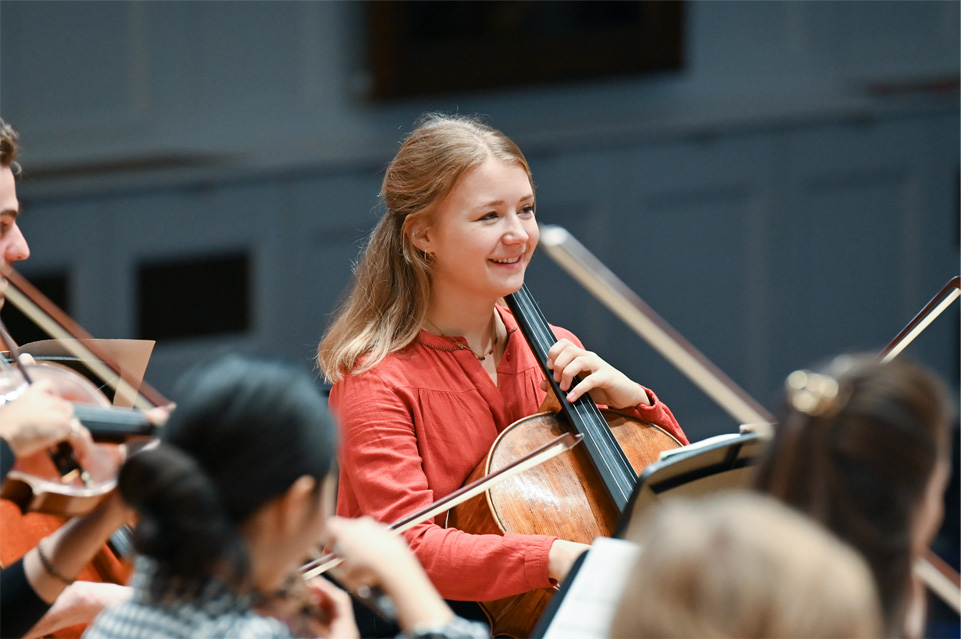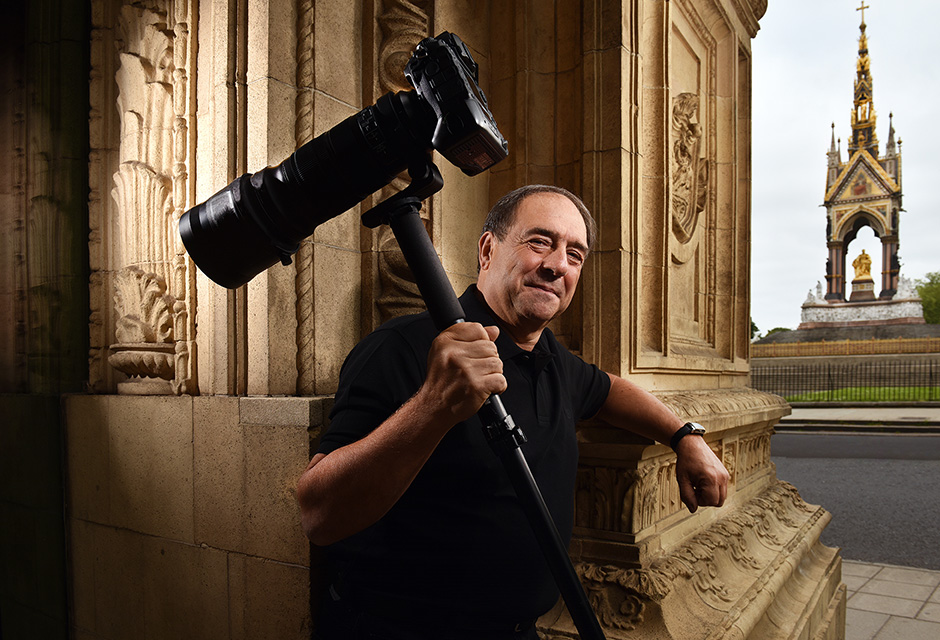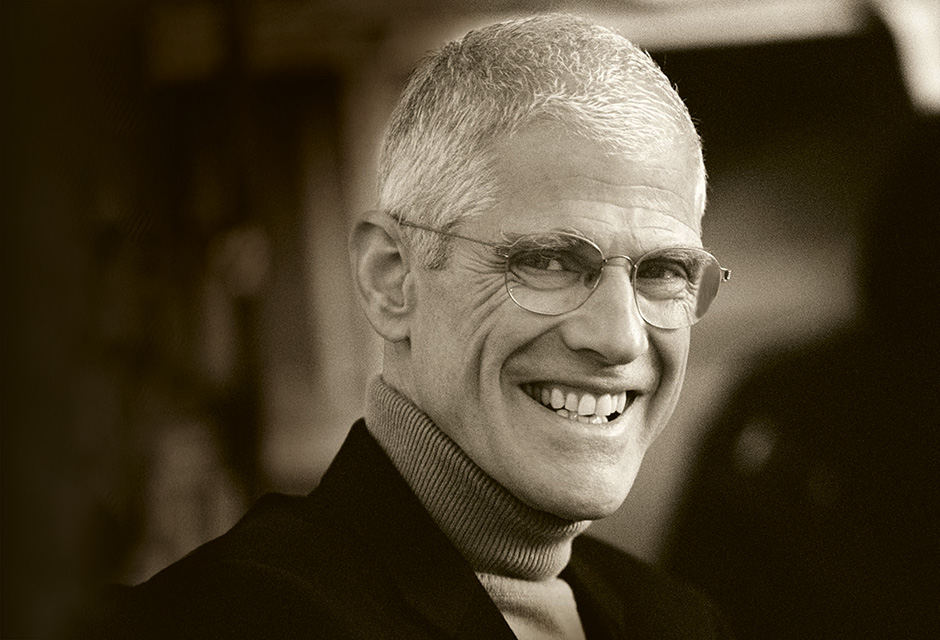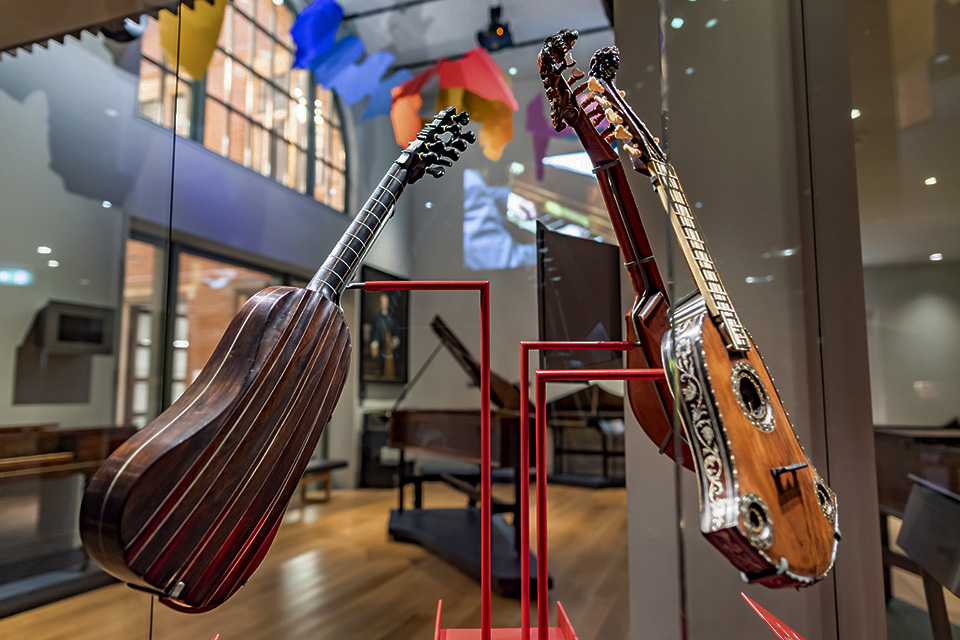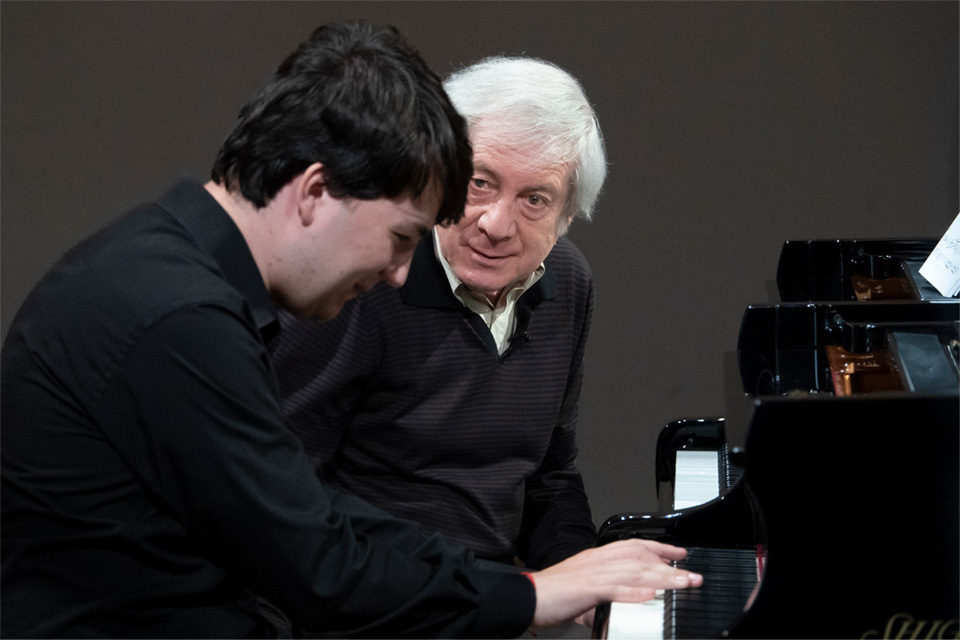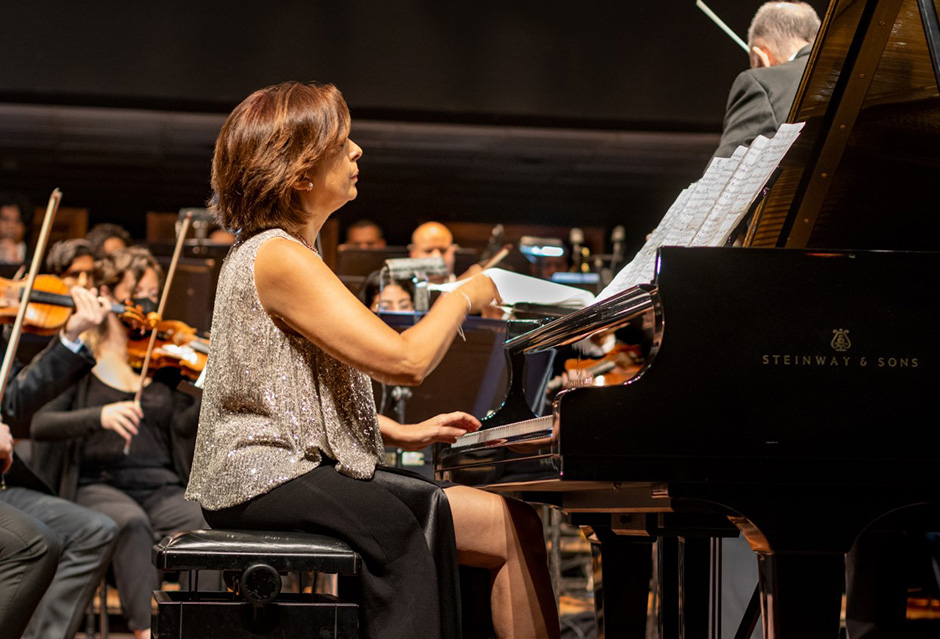Opera for all: the story of Sir Peter Jonas FRCM
Share #UpbeatOnline
Sir Peter Jonas FRCM, RCM alumnus and former RCM Council member, was a renowned opera company director including as general director of English National Opera from 1985 to 1993.
His life, career and death are explored in a new biography by Julia Glesner, Opera for All. Proceeds from the book will go towards the RCM Scholarships Fund.
John Nickson, RCM Scholarship Donor, Legacy pledger and a former RCM Council member, shares some of the stories from Peter’s extraordinary life, and his personal memories of the great impresario.
By John Nickson
Sir Peter Jonas (1946–2020) is a star in the musical firmament. He was one of the leading cultural figures of his generation in an outstanding career at the Chicago Symphony Orchestra, English National Opera and the Bavarian Staatsoper in Munich. His studies at the RCM were to prove seminal in his championship of opera.
An early passion for opera
Peter’s life story takes us deep into the turmoil of the 20th century. Born in London after the Second World War, his father was a Jewish refugee from Nazi Germany and his mother was a Catholic of Jamaican and Lebanese descent.
He became ‘infected with the virus of music’ at the Benedictine Worth College from the age of six, volunteered at Glyndebourne Opera whilst at the University of Sussex, studied at the Royal Northern College and then at the Royal College of Music where he fell in love with opera.
Peter was an RCM postgraduate singing scholar between 1971 and 1973. He immersed himself in music from the Library’s collection and learned how opera is made thanks to the generosity of Peter Morrison, a college donor.
The fact that I could play with a straight bat was more important for my career than many other things.
Sir Peter Jonas on playing cricket while a student at the RCM
Morrison made two front row seats at the Royal Opera House available to RCM students for each performance. Peter went to everything, often several times. He saw all nine performances of Don Carlos directed by Luchino Visconti, and soon realised that he knew almost the entire opera repertoire.
Cricket was also a feature of College life at the time, because it was a passion for Keith Falkner, RCM Director. Peter was a talented player: ‘The fact that I could play with a straight bat was more important for my career than many other things. It’s how I managed to be Intendant at Bayerische Staatsoper.’
Self-discovery in the United States
Keith Falkner said to him: ‘What are we going to do with you? You're not a good instrumentalist, not a good singer, but you know so much.’
Falkner advised Peter to apply for a scholarship at the Eastman School, Rochester in New York. Armed with an encyclopedic knowledge and obsession with music, in 1974 he became assistant to Sir Georg Solti, music director of the Chicago Symphony Orchestra, and subsequently artistic administrator in 1978.
In 1976, during a routine medical, Peter was diagnosed with Hodgkins Lymphoma and initially given a year to live. He struggled with cancer for the remainder of his life, an exemplar of determination and valour.
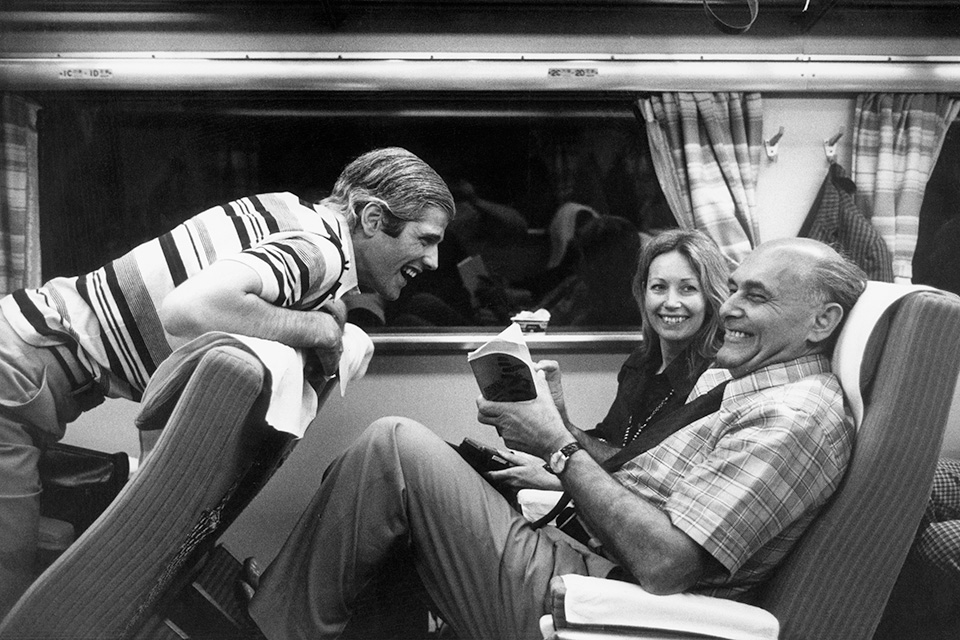
Sir Peter Jonas (left), pictured on a train with Lady Valerie Solti and Sir Georg Solti in the 1970s. Photo: From the personal collection of Barbara Burgdorf
A new era at English National Opera
When Peter became general director of English National Opera in 1985, the groundwork for what became the Powerhouse era had been laid by Lord Harewood, his predecessor, who recreated ENO as an ensemble company with the appointment of Mark Elder as Music Director and David Pountney as Director of Productions.
The new management became known for acclaimed productions such as Rusalka, Lady Macbeth of Mtsensk, Billy Budd, Rigoletto, Xerxes and A Masked Ball. Audiences were alternatively thrilled, shocked and sometimes outraged, as were the critics. There was never a dull moment.
For the first time in the UK, a company of directors, singers and musicians, together with marketing and fundraising professionals, worked together to achieve common aesthetic, cultural, promotional and funding goals. ENO’s aim was to emphasise the power of drama as well as music.
In 1992, The Guardian said: ‘The most consistently innovative of all the British companies, it is ENO’s approach that is generating the operatic audiences of tomorrow’.
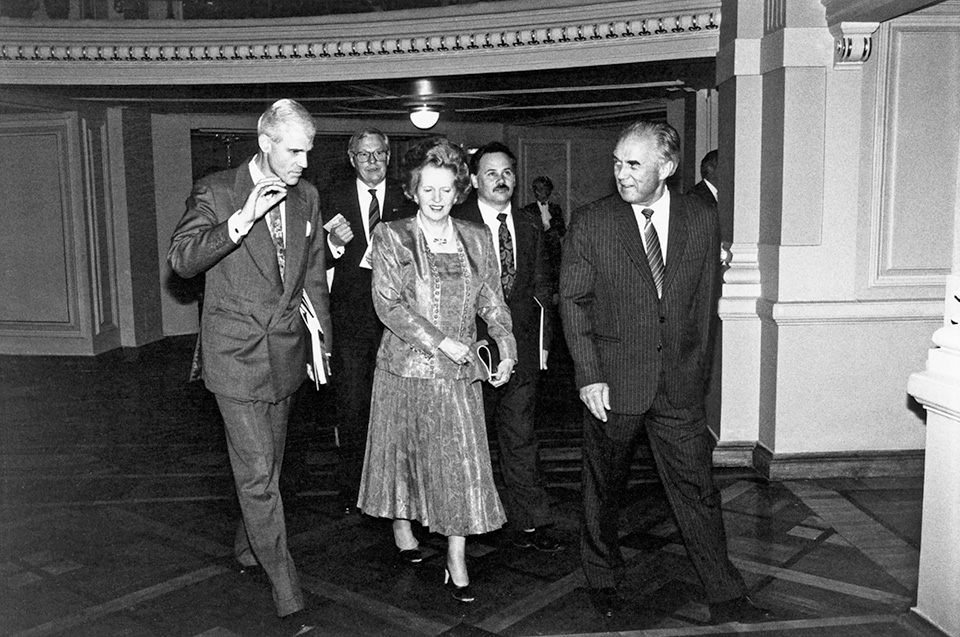
Sir Peter Jonas (left), pictured with former UK Prime Minister Margaret Thatcher at an English National Opera event. Photo: From the personal collection of Barbara Burgdorf
Moving to the Bayersiche Staatsoper
After leaving ENO in 1993, Peter served as Intendant of the Bayersiche Staatsoper until he retired from executive life at the age of 60. His appointment to Munich was a testament to the international standing of British Opera in the 1990s.
Peter said of his time in Munich: ‘To be considered a successful opera director in Germany, one has to show much more than balanced accounts and flourishing box office returns. One must at least give the impression that one’s house is adventurous and provocative in order to make a name in society.’
The Jonas regime became known for adventure, a high-quality expansion of the repertoire, including his beloved Handel, and for leading the Bavarian Staatsoper into the modern era.
According to Nikolaus Bachler, his successor in Munich: ‘For decades, he shaped musical theatre and concert life with courage, originality, energy and irrepressible desire to take risks. He completely redefined the audience’s feeling and understanding of opera, far beyond Munich: he found this art form a place in the 21st century’.
Opera for All gives a remarkable insight to an exceptional man, the miracle of how opera is made and into Peter’s friendships with musicians – notably Daniel Barenboim – who played for him in his last days.
I owe my professional life to Peter Jonas.
John Nickson
A personal connection
I owe my professional life to Peter Jonas. In 1989, at the beginning of my career, it was a great surprise when he asked me to be responsible for fundraising at ENO. He told me that he knew I could do the job and that he would teach me what I did not know.
That was how Peter operated and he was true to his word. I went on to head up fundraising at the Royal Academy of Arts and Tate where I unconsciously learned how to be a donor through my friendships with our supporters. When I had the means, I started giving. On becoming a member of the RCM governing Council, we funded scholarships for the Wind Faculty.
Peter became a close and beloved friend. When cancer eventually claimed him, his family decided that proceeds from the English language edition of Opera for All should benefit the Royal College of Music via our John Nickson and Simon Rew Scholarship in memory of Sir Peter Jonas. We agreed that we should henceforth support singers.
I hope that whilst looking down from Heaven (think the evening star in Tannhäuser), Peter will approve. His musical education was entirely funded by scholarships. Meanwhile, I take comfort that at some point in the future, the spirits of our families will be reunited in supporting young singers at the RCM in perpetuity.
Opera for All, a new biography about Sir Peter Jonas by Professor Julia Glesner, is available on Amazon. Proceeds from the book will go to the John Nickson and Simon Rew Scholarship in memory of Sir Peter Jonas.


